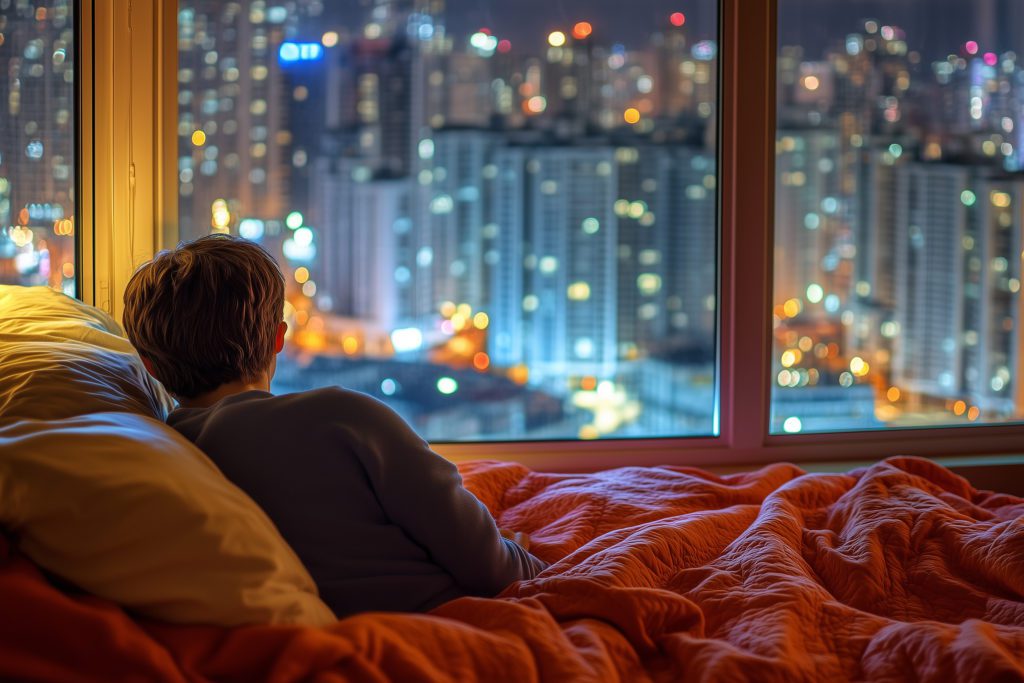
Is Sleep Your New Year’s Resolution? Here’s 5 Tips To Make It Stick
Improving your sleep is one of the best New Year’s resolutions you can make. Sleep is linked to mental and physical health. Here are tips for sleep goals.

When it comes to New Year’s resolutions, eating healthy, exercising, and quitting smoking are at the top of most people’s lists. Although those things are important, we think that getting enough sleep should be at the top of your New Year’s Resolution list. Here’s why: sleep can seriously impact your performance at work, and physical and mental health. Getting enough sleep is seriously one of the best things you can do for your health. And, most people aren’t getting adequate amounts of sleep.
More than 70 million Americans have chronic sleep issues. That means that they are sleep-deprived and not functioning at their best. The average amount of sleep an adult needs is between seven to nine hours a night. One in three adults doesn’t get enough sleep.
Why Getting Enough Sleep is Essential
During deep sleep, toxins that are related to Alzheimer’s, Parkinson’s, and other neurological disorders are flushed out of the brain. When you don’t get enough sleep, this process doesn’t take place fully. Over time, this increases the risk of neurological problems.
Getting enough sleep reduces the risk of accidents. Research conducted by the American Automobile Association (AAA) found that drivers who sleep less than five hours per day had 1.9 times the crash rate as those who slept 7 hours or more.
Sleeping more can help you better stick to your diet. When we don’t get enough sleep, it affects hormones that regulate hunger. This can cause overeating and lead to cravings for food that is high in fat, calories, and sodium. Also, being sleepy can lead you to choose foods that are high in sugar or caffeine to get an energy boost.
When you get enough sleep, you are much less likely to get sick. Studies have shown that a lack of sleep increases the risk of getting sick with infections like the flu. Research published in the journal Frontiers in Psychiatry found that those who slept less than six hours a night were 27 percent more likely to develop an infection compared to those who slept seven hours or more. In addition, when you aren’t well-rested, it takes longer for you to get over an illness.
Sleep is also important for mental health. Poor sleep can leave you vulnerable to depression and other mental health issues like anxiety and post-traumatic stress disorder. When you consistently get enough sleep, it improves your mental well-being.
How to Keep Your Resolution of Getting Better Sleep
New Year’s resolutions are much easier to make than to keep. More than 90 percent of New Year’s resolutions are given up on within just a few months. By March, most people have settled back into old patterns of behavior. Here’s how to get your sleep goals to stick.
1. Set a Goal
Choose a specific achievable sleep goal. Make a resolution that you think you can keep. Try setting the SMART method to set your goal. A SMART goal is specific, measurable, attainable, relevant, and timely. For example, your goal might be:
“Within one month, I will get at least 7 hours of sleep a night.”
2. Make a Plan
If your goal is to get seven or more hours of sleep a night, how will you achieve that? Focus on the habits that you will need to develop to achieve your sleep goals. Some ideas include:
- Increase your knowledge about sleep.
- Establish a consistent bedtime and wake-up time.
- Reset your sleep schedule.
- Use the sleep-friendly tech settings available on your phone, such as the Sleep Focus setting on iOS, which helps you reduce distractions before bed or the “Blue Light Filter” available on Android. This feature helps decrease your exposure to blue light.
- Do something calming before bed like yoga or listening to an adult bedtime story.
- Create a solid bedtime routine that can help you wind down.
- Invest in an air conditioner to keep your bedroom cooler.
- Listen to sleep stories on Pillow or sleep-focused podcasts.
Snuggle up with a book before bed. - Drink less alcohol and stop drinking five hours before bed.
- See a doctor if your sleep doesn’t improve within one month.
Once you identify the habits that you want to incorporate into your life, make a plan to do so.
3. Start With Small Steps
Radically altering your normal behavior is a surefire way to derail your New Year’s resolution. Humans are not wired to make large, sweeping life changes. Focus on smaller, easier steps that can help you reach your long-term goal.
So, for example, if you are currently getting 5 hours of sleep a night, and want to increase that to seven, don’t try to move your bedtime up by two hours at once. Instead, adjust your bedtime in 15-minute increments until you get to where you want to be.
4. Stay Consistent
Stay consistent with your sleep goals and keep working at improving your sleep. You will no doubt face setbacks along the way. Perhaps you stray from your sleep schedule, for instance, but just get back on track and keep working towards it.
It might take six months or more before you see real changes in your sleep. But, change will become a habit if you stick with it.
5. Track Your Progress
If you want to stay on track with your New Year’s resolution of getting better sleep, you have to track your progress. If your goal is to get more sleep, for instance, you should monitor your shut-eye. Enlist some help from technology to help you do this. A sleep tracker, like Pillow, can provide important insight into your sleep habits and help you visualize your progress.
You can also use a journal to track your sleep progress. Honestly reflect on your progress and identify things that may be sabotaging your sleep goals, like sleeping in on the weekends to try to “catch up” on sleep.
New Year, Better Sleep
Making sleep your number one New Year’s resolution is a great way to improve your health and feel your best. Following the tips above will help you set and keep New Year’s sleep resolutions so that you can achieve better zzz’s.

Written by
Emily Mendez
Emily Mendez is a former therapist and mental health author. She is one of the leading voices in mental health. Emily's writing has appeared in eCounseling, SonderMind, and more. Emily is frequently interviewed by Healthline, Fatherly, INSIDER, Family Circle, and other national media for her advice and expert opinion on the latest mental health topics.
Download Pillow
Get help
Press & News
Legal
Connect
X (Twitter)
Company
Copyright © Neybox Digital Ltd.



